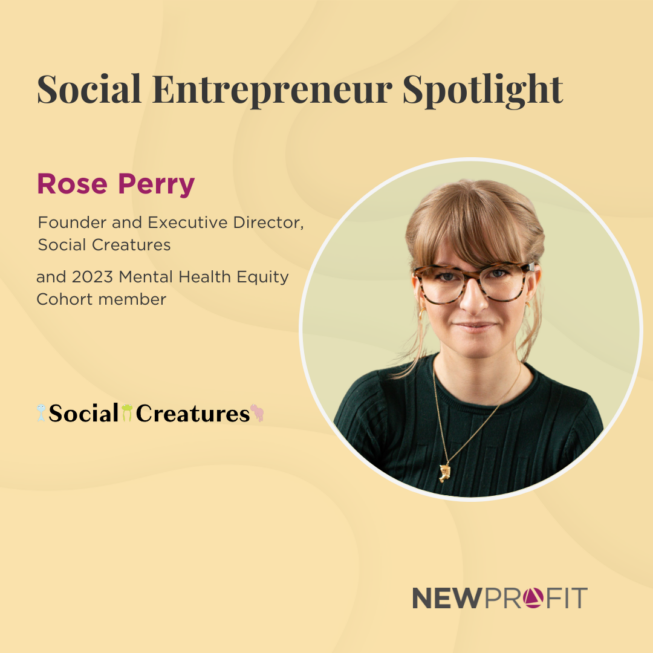Social Entrepreneur Spotlight: Rose Perry of Social Creatures

Social Creatures, part of New Profit’s Mental Health Equity Catalyze Cohort of Social Entrepreneurs, aims to improve health equity outcomes by ensuring that any individual can socially connect with others, no matter the circumstances. They leverage a systems-level theory of change to work towards this mission that combines science communication, advocacy, and community-led social innovation. Through this multi-pronged approach Social Creatures builds bridges between communities with lived experiences of loneliness and health disparities, academics, practitioners, payers, and policymakers, to foster an ecosystem where social health is understood and deeply valued through a health equity lens.
To help us get closer to Social Creatures’ work, Founder and Executive Director Rose Perry, PhD, took time to highlight why social health matters and how the disability rights movement has shaped their work.
Q: What is the one thing you wish more people knew about the issue your organization is working to solve?
A: I wish that more people understood that beyond physical health and mental health, there is a third equally vital pillar of health: social health. Social health is an often underestimated facet of overall well-being, rooted in social connections and community, that remains regrettably sidelined within healthcare and public health endeavors, despite its profound influence on our mental and physical health, as well as our overall lifespan. Research has demonstrated that loneliness and social isolation can elevate the risk of heart disease by up to 51%, stroke by 32%, and even overall mortality by 30%. Conversely, studies have found that supportive social relationships can lower the risk and improve health outcomes. For instance, people with higher levels of social support or more diverse social networks are less likely to develop heart disease or experience a heart attack or stroke. In fact, even having just one supportive relationship can improve recovery from coronary heart disease. It’s an absolute imperative that we prioritize social health in our national healthcare strategy.
Q: What person/people have had the biggest influence on your involvement in this work up until this point?
A: In terms of initially getting involved in this area of work, I was most influenced by “the mother” of the disability rights movement, Judy Heumann. Judy was a fierce advocate for social inclusion and creating infrastructure that is accessible to all, and achieved significant legislative and cultural advancements for the inclusion of disabled individuals in education, employment, and society as a whole across her lifetime. She did so largely by leveraging the power of community and collaboration; as the disability pride movement has gained momentum throughout history, a robust community of disabled individuals and nondisabled allies (community members and legislators alike) have banded together to create a more connected and inclusive nation for disabled individuals. As a woman with dwarfism, I have personally benefited throughout my life from the advancements made by Judy and other disability rights activists. Drawing inspiration from the disability rights movement, we at Social Creatures approach social change through the lens of pride, dignity, community, and collaboration as we work towards building a world where every individual is included, connected, and truly belongs. I’m also intensely motivated by the individuals who engage in Social Creatures programs. They push me in my day to day work, and are Social Creatures’ biggest cheerleaders.
Q: What has been the most fulfilling part of the work that you do?
A: After working in academia as a neuroscientist for over a decade, the most fulfilling aspect of my work with Social Creatures is seeing the more immediate impact that our programs have on individuals. In the academic research world, discovery is incremental and often takes years or even decades to progress from discovery to real-world impact. By making the translation of research into action an imperative, while also integrating community co-design principles that consider the needs and preferences of our target populations in real-time, we have been able to create social health programs that people not only need and want, but experience positive benefit from. Participants have reported increased social connection and inclusion, improved quality of life, and even benefits to their mental and physical health as a result of engaging in our programs. It is perhaps the most fulfilling when I learn that friendships and communities that formed in our programs are still going strong, even after their participation in our programs has completed.
Q: What would have to be true for the work that you do to not be needed?
A: When we think about feeling lonely or isolated, we often see it as a personal problem. But to really tackle the big social issues of our time – like loneliness, social isolation, and exclusion – we need systems-level changes. This means that our health systems, both private and public, should treat social well-being as just as important as physical and mental health. This means screening for social health problems, and investing in the development and implementation of evidence-based social health programs and solutions, including the creation of equitable social infrastructure. Even insurance companies should understand how much being connected to others affects our health, and they should help cover the costs of these solutions, making billing codes that support the sustainability of social health practices. Finally, it’s also important that social health solutions are designed with health equity in front of mind, so as to not inadvertently widen existing health equities. (Almost three in four people [72%] who receive health benefits through Medicaid are classified as lonely.) These efforts require not only robust cross-sector collaboration but a shared vision between policymakers, practitioners, and community members to all work together with the same goal.
To get closer to Social Creatures visit their website, follow them on Facebook, Instagram, LinkedIn, and Twitter.